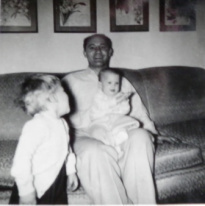Casting Off Old Family Patterns
I’ve been crying on and off for the past few days, mourning the loss of my brother. He’s still alive, at least physically, but he is so very lost to schizophrenia, alternate personalities, alcoholism or some combination of all three, that it seems as if he is gone forever.
I remember him as a bright twelve-year-old — bright as in joyous, bright as in super intelligent, bright as in the favored child, bright as in open-faced, eagerly awaiting all life had in store for him. Family stories indicate I idolized him, but that was so long ago, I can barely remember anything but being wary of the angry, frightened, intolerant, relentless, bellowing man he has become. To most of my siblings, the neighbors, even the cops who have come to the house, he is, at best, a nuisance and at worst, an animal.
And yet, whatever he has become, he is still a human being.
In June, Robert Wilkinson wrote about the retrograde Mercury: Some will see what contributes to hesitation or insecurity about a life corner that’s already been turned, preparing to reshape their expression before moving forward boldly in July. Others will take a look back, say goodbye, and cast off the old family patterns forever. This can give us a new look at fluid ways of moving with life energies.
 The major unresolved family pattern in my life is that of my father, older brother, and me. Those two shaped my adolescence and early adulthood with their fighting and the inability of both to ever see any side but their own. Both used my love as a rope in their tug of war, and it was only when I met Jeff, my life mate/soul mate, that the pattern changed. But not forever. When he died, I went to look after my then 93-year-old father in an effort to restore the Karma of my early life, and fourteen months ago, my brother showed up. And the pattern repeated itself, with each using me as the rope in their tug of war.
The major unresolved family pattern in my life is that of my father, older brother, and me. Those two shaped my adolescence and early adulthood with their fighting and the inability of both to ever see any side but their own. Both used my love as a rope in their tug of war, and it was only when I met Jeff, my life mate/soul mate, that the pattern changed. But not forever. When he died, I went to look after my then 93-year-old father in an effort to restore the Karma of my early life, and fourteen months ago, my brother showed up. And the pattern repeated itself, with each using me as the rope in their tug of war.
Perhaps neither of them could help what they became, but I hoped I could change the pattern of our relationship. My father kicked my brother out of the house when he was a teenager, and when he again wanted to kick him out last year because of some innocuous offense, I counseled against it. And yet, as soon as I left the house that day to run errands, our father tricked his son into leaving and locked him out.
Such patterns seem impossible to change, but a week ago, my sister came to help take care of our father and perhaps to do what she can to help relocate my brother. This constitutes a major shift in our dysfunctional threesome.
I seem to feel the change more than anyone, weeping at what might have been, never was, and never will be. I know now that whatever I hoped out of this insane living situation will never come to pass. My brother will never be bright as youngster I once knew, nor will he ever be the adventurer he was as a young man, where the whole world was his backyard. And my father will never be anything but what he is.
It is I who will have to change, and weeping, apparently, is how I process change. I always hoped that when my responsibilities here were finished, that those patterns of the past would no longer haunt me, but I expected it to be a joyful change. I suppose at some point, when I am truly free, the joy will irrupt, but for now, all I can do is cry for the loss of that bright, sane older brother, and a wise father who could fix anything, even himself.
***
Pat Bertram is the author of the suspense novels Light Bringer, More Deaths Than One, A Spark of Heavenly Fire, and Daughter Am I. Bertram is also the author of Grief: The Great Yearning, “an exquisite book, wrenching to read, and at the same time full of profound truths.” Connect with Pat on Google+. Like Pat on Facebook.
Tagged: changing family patterns, grieving what might have been, mental illness, mourning the living





